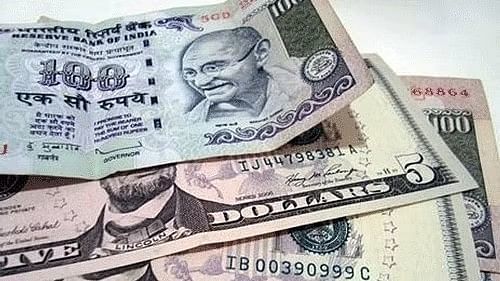
Representative image showing Indian Rupee and US Dollar.
Credit: PTI File Photo
Mumbai: Indian firms are opting for cross-currency swaps to convert part of their rupee debt into dollars in an attempt to trim borrowing costs as US interest rates decline, six bankers told Reuters.
The Federal Reserve began easing with a larger-than-expected 50 basis point rate cut on Wednesday and is projected to reduce borrowing costs by a total of 200 bps over the next 15 months, as per the central bank's forecast.
Two Indian conglomerates, a local unit of a global investment firm, and a renewable energy company recently used cross-currency swaps to convert rupee liabilities into dollars, a banker at a foreign bank said.
The banker did not want to be named because he is not authorised to speak to the media.
Cross-currency swaps are derivative structures that allow companies to convert loan principal, interest repayments, or both, from one currency to another, helping manage interest rates and forex risk.
"Those expecting lower US rates in the future may consider converting INR liabilities to floating-rate USD liabilities through currency swaps, or principal-only swaps, as a cost-reduction measure," Ashhish Vaidya, managing director and treasurer, global financial markets at DBS Bank India, said.
Banks and foreign exchange advisors are suggesting clients use the 2-year tenure for the currency swap because it is offering the highest interest rate saving currently, the bankers said.
The US secured overnight financing rate (SOFR), a benchmark rate for dollar-denominated derivatives, has been declining in anticipation of the rate cut, with the 2-year SOFR down 35 bps so far in September and 120 bps on the quarter.
In contrast, India's 2-year Mumbai Interbank Forward Offered Rate is down just 20 bps in September and 74 bps on the quarter.
The widened US-India rate spread offers companies a larger margin of safety when converting rupee borrowings into dollar loans via currency swaps.
Currency swaps not risk-free
Currency swaps, while saving companies on interest costs, can expose them to foreign exchange risk, potentially negating interest savings and leaving the firm at a disadvantage if the rupee depreciates significantly by the time the swap is reversed.
Analysts say that the rupee's low volatility fosters corporate confidence in these trades.
Companies that have a natural hedge though dollar-denominated receivables can also mitigate a part of the currency risk.
"Corporates who have strong risk management framework or a natural hedge would be more suited to do such INR to USD swaps," Akshay Kumar, head of global markets India at BNP Paribas said.